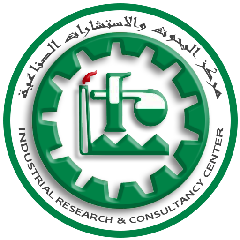The Industrial Research and Consultancy Center (IRCC), Sudan, was established in 1965 with the assistance of UNIDO (United Nations Industrial Development Organization) as a national noncommercial R&D and consultancy center. The center conducts research and provides consultancy services to the private and public industrial sectors in Sudan focusing on efficient utilization of material and resources. IRCC is governed by the IRCC Act of 1981 which provides the center financial and organizational independence as a parastatal organization, although it is known as the technical arm of the Ministry of Industry due to the fact that it is directly connected to the Minister of Industry. IRCC is therefore the technical arm of the State of Sudan in the industrial field and in industrial development overall.
IRCC aims to contribute to the development of the industrial sector in Sudan by utilizing scientific knowledge to link research policies and organizational objectives leading to the realization of national development programs, providing alternatives for imports and increasing exports. Accordingly, IRCC’s scope was defined in the 1981 act as follows:
- R&D on local material as industrial inputs.
- Contribute to creating national industrial development programs and plans.
- Design and engineering of small industries and related technology localization activities.
- Contribute to standardization of local industries.
- Technical feasibility studies for the private and public sector.
- Establish a national knowledge center and participate in effective networking with similar institutions.
- Provide consultancy services in industrial design, engineering process production management, costing, management systems, quality assurance and product development.
- Raise awareness regarding matters related to the industrial field.
The Vision
To efficiently and actively contribute to the well being of the Sudanese people as a scientific institution through technology development and localization, thereby increasing the productivity and competitiveness of the Sudanese industry regionally and internationally via effective collaboration with partners and stakeholders.
The Mission
To effectively conduct research and consultation activities to achieve higher utilization of national resources, increase added value and industrial quality, as well as design innovative high-quality products to achieve higher competitiveness of products and national consultation services.
Current activities taking place at the IRCC include:
- Conducting scientific (applied) research and R&D;
- Providing consultancy services in various fields of industrial development;
- Raising awareness and providing knowledge in the field of industrial development (publications, conferences and seminars);
- Trainings targeting industry, students and young graduates; and
- Providing testing and analysis service for industrial materials and commodities, as per industry request and for accreditation by the Sudanese Standards and Metrology Organization (SSMO).
Laying clear strategies, investing in R&D and increasing national capacity with regards to technology have been main pillars in the success of any country that managed to achieve significant industrial development (say IRCC – Structural Reform and Strategic Positioning 2020 – 2022 within the last four decades, , for comparative reasons). Research and Technology Organization (RTOs) play a significant role in national industrial systems (as well as national innovation systems) as they connect the ‘triple helix’ of the state, private sector and academia and help in improving their collective contribution towards sustainable industrial development.
Accordingly, investing in RTOs becomes a developmental necessity for countries aiming to achieve sustainable development.
Today, IRCC is faced with the opportunity to reestablish its rightful position within the aforementioned triple helix thereby providing significant added value to industrial development efforts in Sudan. This requires both structural reform activities as well as strategic positioning activities; both of which represent the main pillars of the IRCC’s strategic plan for the 2020 – 2022 period (aka strategy 20-22).
